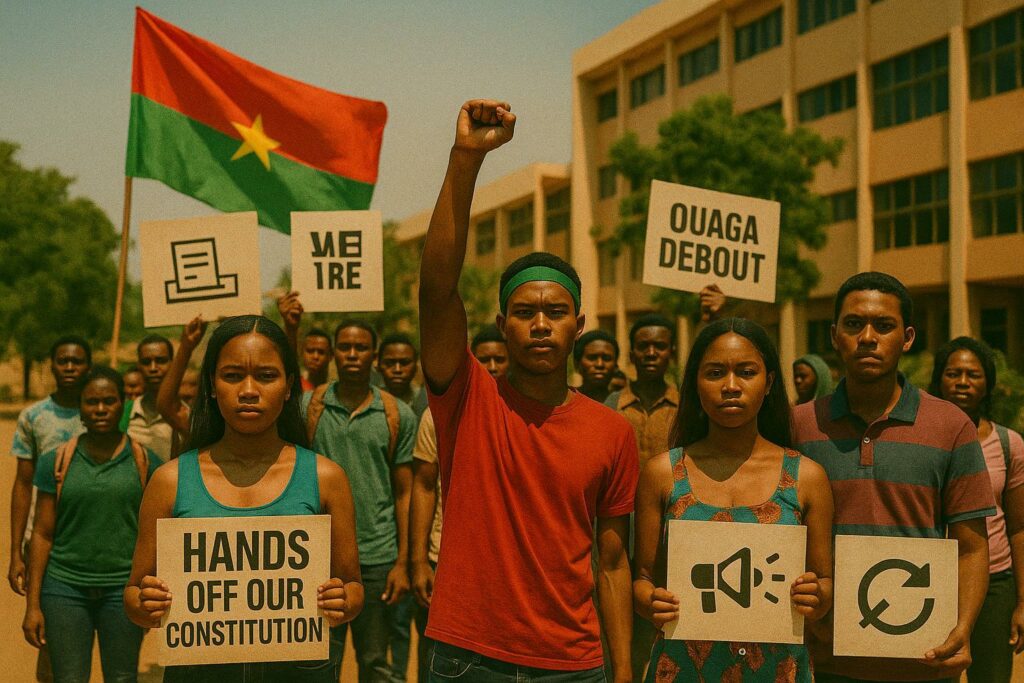A Spectre of 2014 Haunts Ouagadougou
When Burkinabè crowds torched the National Assembly in October 2014, the gesture signalled more than the end of Blaise Compaoré’s interminable presidency; it announced a popular authorship of constitutional order. The chants—“Hands off our Constitution” and “We are the future”—reclaimed sovereignty as a collective verb rather than a juridical noun. Political scientists duly celebrated a rare instance of non-violent regime change in the Sahel. Yet, almost ten years on, the promise of popular authorship appears suspended rather than fulfilled, raising the question of what became of that insurgent grammar.
From Palace Fires to Parade Grounds
The first disappointment surfaced early. President Roch Marc Christian Kaboré, elected in 2015 with reformist vows, struggled to recalibrate civil-military relations even as jihadist groups swept across the northern provinces. His incrementalism alienated a politicised youth accustomed to immediacy. Two successive coups followed in January and September 2022, culminating in Captain Ibrahim Traoré’s junta. While soldiers justified their takeover as a response to insecurity—a claim echoed by the International Crisis Group (2023)—they also draped themselves in the aesthetic of 2014: fatigues reminiscent of Thomas Sankara, revolutionary murals, and televised speeches peppered with anti-imperial bravado.
Semiotic Co-optation as Governance Technology
The current authorities have mastered what semioticians call sign inversion: an operation by which symbols of resistance are re-coded to sanctify power. Traoré’s government renovated Sankara’s mausoleum and baptised public squares after 2014 martyrs, yet independent radio stations critical of military rule have been shuttered and at least eight journalists briefly detained since mid-2023 (Human Rights Watch, 2024). The grammar of rupture survives, but its syntax now serves presidential communiqués written in khaki.
Discursive substitution thus replaces substantive reform. Youth inclusion, once demanded through hashtags, is largely ceremonial; fewer than 5 % of ministerial posts are held by individuals under forty. Similarly, calls for transparent budgeting yielded to emergency decrees that bypass parliamentary oversight.
Geopolitical Recalibration or New Dependency?
Symbolic sovereignty also plays out on the international stage. In January 2023 Burkina Faso ordered French troops to depart, echoing similar moves in Mali and Niger. Russian instructors and Turkish drones quickly filled the vacuum, enabling Traoré to pose as the architect of a decolonial realignment. Yet arms contracts signed with Moscow remain opaque, and the Wagner Group’s alleged presence in gold-rich regions complicates the narrative of recovered autonomy (Reuters, 26 September 2023).
Diplomats note that an extractive barter—security assistance for mining concessions—risks replicating the asymmetrical dependencies the junta denounces. Sovereignty proclaimed in iconography remains fragile when balance-of-payments support hinges on new patrons.
The Persistent Human Security Deficit
While Ouagadougou’s billboards celebrate self-reliance, the humanitarian ledger tells another story. More than 2 million citizens are internally displaced and 6.5 million require assistance, according to UN OCHA (January 2024). Armed groups affiliated with al-Qaeda and Islamic State contest nearly half of national territory, leaving entire provinces under de facto blockade. Schools in the Sahel and Est regions remain closed, depriving over 800 000 children of education. Against this backdrop, the performative politics of sovereignty masks a tangible crisis of governability.
Possible Futures of the Revolutionary Lexicon
History suggests that when symbols substitute for redistribution, the semiotic surplus eventually exhausts itself. Should economic malaise deepen and security gains stall, slogans emblazoned on ministerial podiums today may be repurposed by tomorrow’s demonstrators. The challenge for Burkina Faso’s rulers is therefore twin-fold: to translate insurgent rhetoric into inclusive institutions, and to demonstrate that the camouflage of revolution can shelter democratic accountability rather than obscure it.

